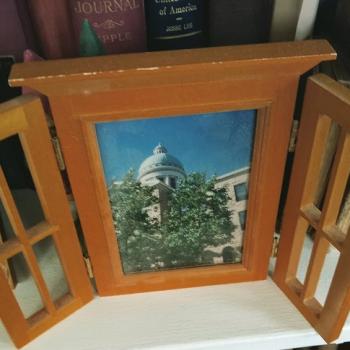Editors’ Note: This article is part of the Patheos Public Square on Engaging the New Year. Read other perspectives here.
By Will Messenger
This post is a contribution to the Patheos January Public Square about our outlook on the New Year and the ways our spirituality can shape that vision.
My chief interest is the intersection of faith and work. So my question is “Does my experience of my faith tradition [Christian] give me a spirit of confidence for my work in 2016, or does it lead me to expect the worst?”
I bring to this question a long string of disappointments at work. I helped launch a start-up biotech company in 1991. It failed. My wife and planted a church with a group of friends in 2004. It closed in 2008. I got a great academic job in the 1990s. I got laid off from it in the 2000s. I’m on the board of directors of another biotech company now. Our first two major clinical trials were halted. I’ve been trying to learn the viola for 12 years. I still can’t play in tune. If I’m pessimistic, I have good reason as far as I’m concerned.
But my faith in Jesus leads me otherwise. “We shall be like him,” we’re told” (1 John 3:2), and Jesus failed worse than me, at least as it seemed at the time of his death. So I’m on the right track! But I’m optimistic that my work will amount to something even before I die, and even in 2016. Because when I look at the Bible I see three ways that God keeps leading people to do good work, and I think they apply to me this year.
One, God gives people skills, talents and abilities, i.e., “gifts.” I’ve got some skills, talents and abilities. Is God going to turn them into “gifts” this year—make them successful instead of disappointing? Yes, if only I can pay attention to the second way God leads people to do good work–paying attention to what the world needs. God gives people skills, talents, and abilities not just so we can feel good about our accomplishments, but so that working together with others we can create more of what the world needs (see Eph. 4:11-16).
That’s good because my many failures have made me a lot better at working with others, if only to make up for my weaknesses, and a lot better at noticing what other people need me to do, instead of what I think will make me look good. The things I didn’t accomplish before give me a much clearer picture of what’s truly worth accomplishing now. And this year, above all, what I want to accomplish is investing in the people I work with, helping them to be successful in their tasks, so we can be more productive together. My team has bigger challenges to success this year than ever before. But I’m optimistic we’ll be successful because I believe in them more than I believe in myself.
This brings us to the third way God guides people in our work—our deepest/truest desires. I think part of my disappointments in work before came because my desire was to be better than the people I worked with. The biotech executive with better ideas than the competition. The pastor so brilliant his new church would succeed against all odds. That didn’t work.
My desire is different now. I’d rather see the people around me fulfill their dreams, see our team reach our shared goals, than see myself excel above everyone else. From what I can see, that’s how God likes to work. It’s how Jesus worked—his church was a success after his people took over the work. The difference: he cared more about his people than himself from the very beginning. Sure, I could have saved myself a lot of disappointment if I’d figured out years ago how Jesus did things. But “see, I make all things new,” God says (Rev. 21:5), maybe even for an old dog like me.
William G. Messenger is the Executive Editor of the Theology of Work Project, Inc., (www.theologyofwork.org), an international organization dedicated to researching, writing, and circulating materials about how the Christian faith can contribute to non-church workplaces. He also serves as an adjunct faculty member of Laidlaw-Carey Graduate School (Auckland, New Zealand), as a guest lecturer at Holy Cross College (Worcester, MA), and formerly as an adjunct professor at Rensselaer Polytechnic Institute (Troy, NY). Will is also a member of the Board of Directors of ArQule, Inc., a biotechnology company near Boston. He is an ordained minister in the Episcopal Church, currently serving the TOW Project rather than a parish. He was previously a marketing and strategy executive in the biotechnology industry. Will lives in the Boston area.













